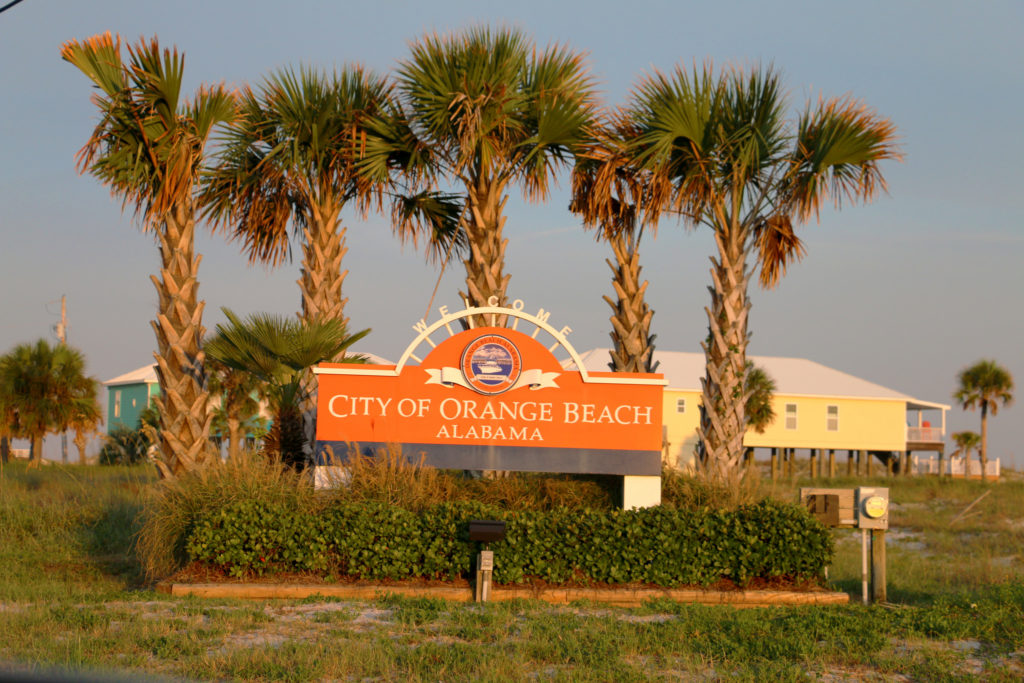Rauf Bolden: Abusing eminent domain in Orange Beach

Confiscating properties through eminent domain to build bridges and roads in Orange Beach is abusive. It rails against conservative ideals. Nothing says socialism quite like seizing private lands, getting what the government wants at all cost. “Eminent domain is a necessary evil,” said Mayor Tony Kennon, according to a report in The Islander (April 25, 2018, page 29). His empathy speaks volumes, justifying governmental property seizures, referring to three families who will lose their home-based businesses on land needed for the Flyover Bridge west of the Foley Beach Express. He might as well have told those families, “Too bad!” The Tom Thumb and its associated businesses in the convenience store’s mall, located at the corner of Canal Road and Hwy 161 are also scheduled for seizure under eminent domain, being demolished and replaced by a double turn lane, enabling better traffic flow for vacationers. It’s troubling not knowing what other economic disenfranchisement plans local government has in mind for business owners and families in Orange Beach. How did we get here? The need to increase condominium building on the beach for tax revenues spurred traffic growth. Years ago the zoning laws were not amended, and now it is too late to stop development. Realizing this Mayor Kennon requested help from the state, asking them to widen the arterial roads, countering the traffic problem. One thing led to another, and we now find ourselves in the predicament of having to confiscate private lands to build additional infrastructure, accommodating more tourist traffic, because growth is in an upward spiral. Orange Beach has come a long way since it was a sleepy fishing village on the Alabama Gulf Coast. It is property rights abuses, associated with confiscating private land that bothers me. Where does the power of eminent domain come from? “The Fifth Amendment to the Constitution [U.S.] says ‘nor shall private property be taken for public use, without just compensation.’ This is a tacit recognition of a preexisting power to take private property for public use, rather than a grant of new power.” Eminent domain “appertains to every independent government. It requires no constitutional recognition; it is an attribute of sovereignty [federal and state],” according to a report on Justia. Power derived from “no constitutional recognition” is subjective, and prone to misapplication. This is what I am arguing here. Slow traffic is not a life and death situation, requiring immediate action like flooding. It is simply a time wasting inconvenience. In my opinion, this does not justify confiscating an individual’s property through eminent domain. Some would say the traffic situation is the result poor planning, related to over development, but we are not going to go there. Municipal employees work very hard with the limited resources at their disposal, trying to satiate the political voices, crying for more tax revenue through increased expansion. Can the government’s plan use strong-arm tactics, forcing landowners to sell? The Alabama Constitution (AL Code § 18-1A-22 (2016)) defines the rules of engagement, “In order to compel an agreement on the price to be paid for the property, a condemnor may not arbitrarily advance the time of condemnation, arbitrarily defer negotiations or condemnation, nor take any other action coercive in nature.” On the face of it you do not have to sell if you do not want to, but government has other tools in its arsenal like ruling your property uninhabitable, offering you an assessed value in exchange for taking it off your hands. Receiving a low ball figure for your property won’t make you feel any better, since your plot has other intrinsic value like memories of your children playing under the oak tree that are priceless to you. These intangibles do not fit into the payment equation. “‘Prior to the adoption of the Fourteenth Amendment,’ the power of eminent domain of state governments ‘was unrestrained by any federal authority’ [Green v. Frazier, 253 U.S. 233, 238 (1920)]. The Just Compensation Clause of the Fifth Amendment did not apply to the states [Barron v. Baltimore, 32 U.S. (7 Pet.) 243 (1833)], but it does now. How can we square the circle of fairness? Well-defined property rights are important because they increase economic activity, bolstering standards of living, quality-of-life, and a strong tax base that is inextricably linked to property rights. Having the specter of property confiscations hanging over your head is contrary to the DNA that is baked into Alabamians – no government interference. I guess the days of personal freedom, relating to private property are over, at least in Orange Beach. “In a new study released by the Cato Institute — a libertarian think tank dedicated to the principles of individual liberty, limited government, free markets, and peace — Alabama was ranked 49th in personal freedom,” according to a report by Elizabeth Patton on Alabama Today. Unless Mayor Kennon wants to step up, guaranteeing elevated prices for seized properties, I see no fair solution or happy ending. Property confiscation is a reflection of personal freedom, because government holds all the cards. It is important to argue the seller should get more money than the assessed value of the property, adding a certain “sweetener” for familial memories lost while being forced to vacate his or her land under eminent domain. In a monetary way, better prices increase personal freedom. Mayor Kennon will counter that confiscations for infrastructure improvements in Orange Beach are not the work of the city, but the state. I argue the city is complicit, colluding with the state, ensuring specific infrastructure improvements happen regardless of which family gets hurt. The instincts to confiscate private lands, ostensibly for the greater good is the thin end of the wedge. Local government must be very careful, using this tool, because irreversible damage can occur, affecting the fabric of the community. Mayor Kennon’s motives are honorable, wanting to accommodate the tourists, easing the amount of traffic on the roads during the summer season. I question the methodology of confiscating property to achieve his ends. Would Mayor Tony
Rauf Bolden: Vanishing property rights in Orange Beach

Power corrupts goes the old saying. Taking away residents’ property rights is the new infatuation, firstly with short-term rentals in residential areas, lastly with property condemnations, acquiring land for the proposed bridge west of the Foley Beach Express. “Eminent domain is a necessary evil,” said Mayor Tony Kennon, referring to three families who will lose their home-based businesses on property needed for the bridge, quoted in the Islander, April 25, 2018, pg. 29. The problem is not one single piece of data or traffic study was offered to the public, supporting the necessity of eminent domain condemnations for the $87 Million second bridge, causing Mr. Jim Ziegler, the State’s Auditor to write a letter to ALDOT’s Director John Cooper, seeking clarification. “I have more questions than I do answers about the proposed additional bridge. I hope to solve that with my specific requests for public records,” Alabama State Auditor Jim Zeigler explained on Twitter. Elected Officials acquiescing on the side of property condemnation is like airing a television campaign against property rights, watching our representatives watching a reality show. In a market system, well-defined property rights are important because they increase economic activity, bolstering standards of living, quality-of-life, and a strong tax base that is inextricably linked to property rights. Using a hammer instead of a scalpel to regulate short-term rentals, prescribing condemnation and eminent domain instead of negotiation to obtain property for the second bridge is scandalously inconsistent with Alabamians’ hatred of government intervention, rewriting the playbook on property rights. Local politicians prefer circling the wagons when residents disagree, appearing to have lost the ability to dissent. Perhaps we should exhale, taking a look at what has grown from the seedling of property rights since Orange Beach was founded in 1984 to the latest Ordinance 2018-1282, limiting vacation rentals. Mayor Tony Kennon said in a Council Meeting, “I want to know who my neighbors are,” commenting on short-term rentals, giving everyone in the room a glimpse into the plan. This rental legislation is like gating the residential community by Ordinance instead of by Referendum or HOA vote, wondering how elected officials will explain themselves for not minimizing government’s role in the economy, for not restoring liberty from government interference, essentially abandoning pre-eminent conservative ideals. By legislating for government restrictions on private property this Council transformed from conservative incumbent right before our eyes. It’s troubling not knowing what other instruments of economic disenfranchisement are on the agenda. What happens east and west of Docs Seafood when the Wolf Bay Bridge is put out for Bid, needing more land for a construction site, parking and a lay-down yard? One must assume properties will be condemned and then confiscated for pennies on the dollar, imitating the greater vanity of eminent domain. “We have to be able to move traffic. We’ve got to be able to evacuate and we have to be able to grow,” said Mayor Tony Kennon to AL.com. I agree that some short-term rental owners have been naughty, insufficiently policing their renters. Residents should call the authorities when renters misbehave, applying laws already on the books, perhaps implementing a three-strikes and you lose your license policy, ensuring Council has the last word. Tarring all residential-rental owners with the same brush is energetic but disillusioned. The Baldwin County Association of REALTORS® (BCAR), representing 2000 Realtors did not endorse candidates who voted for the Orange Beach residential rental ordinance, according to the BCAR web site. “REALTORS® care about communities and candidates who support private property rights,” said Sheila Dodson, CEO of BCAR. “This is just another platform to show the involvement of REALTORS® in their community.” A short-term rental ban, and eminent domain sit on the plate before us, cleverly salted to kneecap the opposition. How we chew and digest these morsels is up to us. ••• Rauf Bolden is retired IT Director at the City of Orange Beach, working as an IT & Web Consultant on the Beach Road. He can be reached at: publisher@velvetillusion.com.

